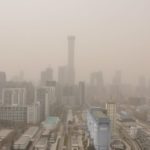 A study from the University of Michigan highlights traffic-related air pollution as a significant risk factor for older adults losing their ability to care for themselves without assistance.
A study from the University of Michigan highlights traffic-related air pollution as a significant risk factor for older adults losing their ability to care for themselves without assistance.
Traffic emissions release fine particulate matter and gases like nitrogen dioxide, which can damage the lungs, heart, brain, and other body parts. The researchers found that long-term exposure to high pollution levels, such as over the 10 years studied, increased the need for help with everyday activities.
Reducing exposure
The study suggests that reducing exposure to traffic-related air pollution could help older adults live independently for longer. “This research indicates that long-term air pollution exposures can lead to persistent health issues that make it harder for older adults to take care of themselves, leading to a need for help with activities they once managed on their own,” the researchers explain.
The study also suggests that where people live affects how well they age. Despite relatively clean air, nearly three-quarters of a million older adults in the United States newly require help with routine daily activities each year due to air pollution exposure. This loss of independence carries high emotional and financial costs for families and the healthcare system.
Using data from 25,314 participants or their survivors, the study documented the need for help with activities like bathing, dressing, getting in and out of bed, walking, shopping, cleaning, using a phone, using the toilet, managing medications, money, or transportation, and moving to a nursing home. The responses were cross-referenced with where participants lived and long-term air pollution levels estimated by an advanced exposure model.
Losing independence
Participants who lost their independence were more likely to be white, have lower education levels, lower wealth, more chronic diseases, and higher exposure to pollutants. Nearly 40% of respondents experienced a new loss of independence during the average 10.2 years they were followed.
“This research extends our understanding of air pollution’s health impacts beyond specific chronic diseases to better capture the cumulative burden of air pollution in late life,” the authors explain. “These findings are crucial as the global population is aging faster than ever before.”
The researchers also estimated the financial cost of lost independence due to air pollution. With a yearly cost of $16,028 per person needing help with daily activities, they estimated that losing independence due to residential exposure to traffic-related air pollution adds up to $11.7 billion in care expenses nationwide per year.